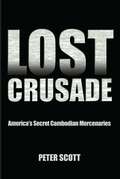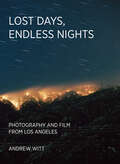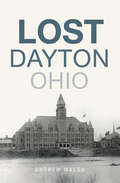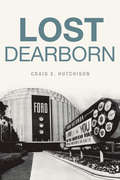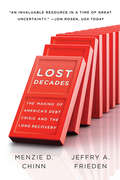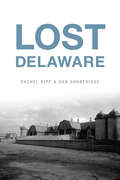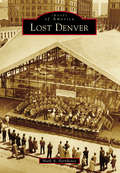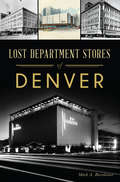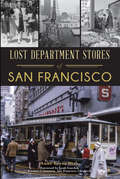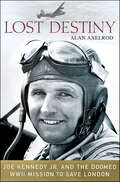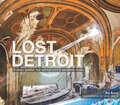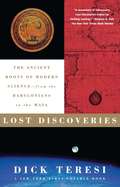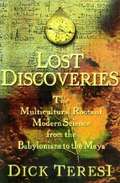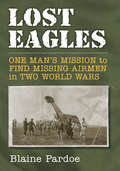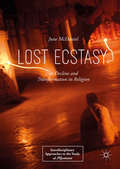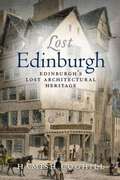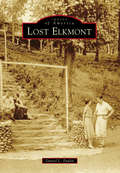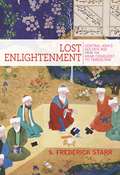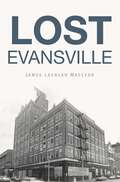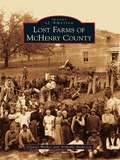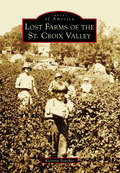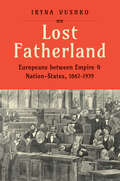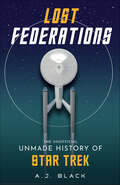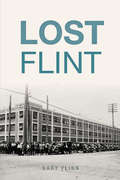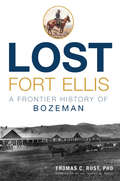- Table View
- List View
Lost Crusade
by Peter ScottWhen Peter Scott began a 1968 tour in Vietnam advising ethnic Cambodian Khmer Krom paramilitaries, they shared only an earnest desire to check the spread of communism. It took nearly thirty years and a chance reunion for him to realize just how much they had become a part of him. Successfully blending intense combat narrative and stirring emotional drama, Scott vividly captures both the unique village culture of a little-known, highly spiritual people and their complex relationship with Special Forces soldiers, who found it increasingly difficult to match their charges' commitment to the costly conflict. Building on his experiences as a Phoenix Program adviser near the Cambodian border, extensive interviews with Khmer Krom survivors, hundreds of hours of research in government archives, and requests for Freedom of Information Act disclosures, Scott seamlessly reconstructs the six-thousand-strong mercenary force's final crusade against communism, beginning in their ancestral home in 1970 and ending on the U.S. West Coast in 1995.
Lost Days, Endless Nights: Photography and Film from Los Angeles
by Andrew WittA critical study and artist&’s book on the history of photography and film from Los Angeles.Lost Days, Endless Nights tells a history from below—an account of the lives of the forgotten and dispossessed of Los Angeles: the unemployed, the precariously employed, the evicted, the alienated, the unhoused, the anxious, the exhausted. Through an analysis of abandoned archival works, experimental films, and other projects, Andrew Witt offers an expansive account of the artists who have lived or worked in Los Angeles, delving into the region&’s history and geography, highlighting its racial, gender, and class conflicts. Presented as a series of nine case studies, Witt explores how artists as diverse as Agnès Varda, Dana Lixenberg, Allan Sekula, Catherine Opie, John Divola, Gregory Halpern, Paul Sepuya, and Guadalupe Rosales have reimagined and reshaped our understanding of contemporary Los Angeles.The book features portraits of those who struggle and attempt to get by in the city: dock workers, students, bus riders, petty criminals, office workers, immigrants, queer and trans activists. Set against the landscape of economic turmoil and environmental crises that shadowed the 1970s, Witt highlights the urgent need for a historical perspective of cultural retrieval and counternarrative. Extending into the present, Lost Days, Endless Nights advocates for an approach that actively embraces the works and projects that have been overlooked and evicted from the historical imaginary.
Lost Dayton, Ohio (Lost)
by Andrew WalshMany of the places that helped make Dayton a center of innovation were lost to history, while others survived and adapted, representing the city's spirit of revitalization. Some of the city's distinctive and significant structures, such as Steele High School and the Callahan Building, were demolished, while others, including the Arcade and Centre City Building, saw hard times but now await redevelopment. Entire neighborhoods, such as the Haymarket, and commercial districts, such as West Fifth Street, vanished and show no traces of their past. Others, including the popular Oregon District, narrowly escaped the wrecking ball. From the Wright Brothers Factory to the park that hosted the first NFL game, Andrew Walsh explores the diverse selection of retail, industrial, entertainment and residential sites from Dayton's disappearing legacy.
Lost Dearborn (Lost)
by Craig E. HutchisonThroughout its existence, Dearborn has been a pioneer settlement, a multicultural hub, a college town, a major tourism center and a world-renowned industrial city. Unfortunately, due to a variety of factors, significant structures have been lost to time. Almost all of the eleven U.S. Arsenal complex buildings have disappeared since the arsenal was closed in 1875. The hallways of the Edison School and Oxford School still live on in the hearts of their students but were razed long ago. Even beloved edifices such as the Ford Rotunda and the Ford Motor Company Administration building, built by Dearborn's favorite son, Henry Ford, are now only a memory. Author Craig E. Hutchison endeavors to immortalize the important foundational building blocks of an evolving city.
Lost Decades: The Making of America's Debt Crisis and the Long Recovery
by Jeffry A. Frieden Menzie D. ChinnA clear, authoritative guide to the crisis of 2008, its continuing repercussions, and the needed reforms ahead. The U.S. economy lost the first decade of the twenty-first century to an ill-conceived boom and subsequent bust. It is in danger of losing another decade to the stagnation of an incomplete recovery. How did this happen? Read this lucid explanation of the origins and long-term effects of the recent financial crisis, drawn in historical and comparative perspective by two leading political economists. By 2008 the United States had become the biggest international borrower in world history, with more than two-thirds of its $6 trillion federal debt in foreign hands. The proportion of foreign loans to the size of the economy put the United States in league with Mexico, Indonesia, and other third-world debtor nations. The massive inflow of foreign funds financed the booms in housing prices and consumer spending that fueled the economy until the collapse of late 2008. This was the most serious international economic crisis since the Great Depression of the 1930s. Menzie Chinn and Jeffry Frieden explain the political and economic roots of this crisis as well as its long-term effects. They explore the political strategies behind the Bush administration's policy of funding massive deficits with foreign borrowing. They show that the crisis was foreseen by many and was avoidable through appropriate policy measures. They examine the continuing impact of our huge debt on the continuing slow recovery from the recession. Lost Decades will long be regarded as the standard account of the crisis and its aftermath.
Lost Delaware (Lost)
by Rachel Kipp Dan ShortridgeFormer Delaware journalists Rachel Kipp and Dan Shortridge document the past, present, and sometimes the future of Delaware's landmarks and legends. Originally part of Pennsylvania and called "the three lower counties on the Delaware," the First State's present has been shaped by both colonial culture and modern industry. Many landmarks of its past, including the Greenbaum Cannery, the Rosedale Beach Hotel, the Nanticoke Queen restaurant, the Ross Point School and the Kahunaville nightclub now live solely in memory. The tales of airplanes and auto plants, breweries and bridges, cows and churches provide insight into the state's many communities, including its Black heritage. Read about fallen hospitals, long-ago lighthouses, crumbling mansions, demolished prisons and theaters that no longer hold shows.
Lost Denver
by Mark BarnhouseNewcomers to the "Mile-High City" of Denver, whether arriving during the 19th, 20th, or 21st centuries, have often remarked on how new the city seems, and how proud its citizens are of it. Heady boom times at various intervals have inspired successive waves of city builders eager to make their mark by building grand, new edifices. Often, these new wonders replaced older structures that earlier Denverites had once seen as great accomplishments. As Denver has grown to become the hub of a major American metropolis, remnants of its earlier heritage have vanished into history, leaving newcomers to ponder, "What makes Denver Denver?" and longtime residents to ask, "Where has my Denver gone?" Lost Denver celebrates what the city once built and has since lost, along with what has made it unique, exploring where and how Denverites once worked, shopped, and played.
Lost Department Stores of Denver (Lost)
by Mark A. BarnhouseDenverites once enjoyed a retail landscape rich with personal touches. Revisit May-D&F's animated holiday windows or the ice skating rink in front of the store. Reminisce about the Christmas chandeliers that stretched for four hundred feet on the main floor of the Denver Dry Goods or the elegance of Neusteters, with its fashion shows and exclusive merchandise. Recall finding that perfect outfit at Fashion Bar and going back-to-school shopping at Joslins. Celebrate salespeople who remembered your name and the comforting feeling of shopping locally where your parents and grandparents shopped. Through decades of research and interviews with former staff, Denver's unofficial "department store historian" Mark Barnhouse assembles the ultimate mosaic of the Mile High City's fabulous retail past.
Lost Department Stores of San Francisco (Landmarks)
by Anne Evers HitzIn the late nineteenth century, San Francisco's merchant princes built grand stores for a booming city, each with its own niche. For the eager clientele, a trip downtown meant dressing up--hats, gloves and stockings required--and going to Blum's for Coffee Crunch cake or Townsend's for creamed spinach. The I. Magnin empire catered to a selective upper-class clientele, while middle-class shoppers loved the Emporium department store with its Bargain Basement and Santa for the kids. Gump's defined good taste, the City of Paris satisfied desires for anything French and edgy, youth-oriented Joseph Magnin ensnared the younger shoppers with the latest trends. Join author Anne Evers Hitz as she looks back at the colorful personalities that created six major stores and defined shopping in San Francisco.
Lost Destiny: Joe Kennedy Jr. and the Doomed WWII Mission to Save London
by Alan AxelrodAlan Axelrod's Lost Destiny is a rare exploration of the origin of today's controversial military drones as well as a searing and unforgettable story of heroism, WWII, and the Kennedy dynasty that might have been.On August 12, 1944, Lieutenant Joseph P. Kennedy, Jr., heir to one of America's most glamorous fortunes, son of the disgraced former ambassador to Great Britain, and big brother to freshly minted PT-109 hero JFK, hoisted himself up into a highly modified B-24 Liberator bomber. The munitions he was carrying that day were fifty percent more powerful than TNT.Kennedy's mission was part of Operation Aphrodite/Project Anvil, a desperate American effort to rescue London from a rain of German V-1 and V-2 missiles. The decision to use these bold but crude precursors to modern-day drones against German V-weapon launch sites came from Air Corps high command. Lieutenant General Jimmy Doolittle, daring leader of the spectacular 1942 Tokyo Raid, and others concocted a plan to install radio control equipment in "war-weary" bombers, pack them with a dozen tons of high explosives, and fly them by remote control directly into the concrete German launch sites—targets too hard to be destroyed by conventional bombs. The catch was that live pilots were needed to get these flying bombs off the ground and headed toward their targets. Joe Jr. was the first naval aviator to fly such a mission. And—in the biggest manmade explosion before Hiroshima—it killed him.
Lost Detroit: Stories Behind the Motor City's Majestic Ruins (Lost Ser.)
by Dan AustinStories and photographs celebrating the city&’s history through its abandoned architectural landmarks. Lost Detroit tells the stories behind twelve of the city&’s most beautiful left-behind landmarks and of the people who occupied them, from the day they opened to the day they closed. While these buildings might stand as ghosts of the past today, their stories live on within these pages. This book brings you the memories of those who caught trains out of the majestic Michigan Central Station, necked with girlfriends in the balcony of the palatial Michigan Theatre, danced the night away at the Vanity Ballroom, and kicked out the jams at the Grande Ballroom. Filled with stunning and often moving photographs, it&’s a treasure for history and architecture buffs, as well as for native Detroiters. &“A fascinating journey.&” —John Gallagher, Detroit Free Press architecture critic, from the Foreword
Lost Discoveries
by Dick TeresiBoldly challenging conventional wisdom, acclaimed science writer and Omni magazine cofounder Dick Teresi traces the origins of contemporary science back to their ancient roots in an eye-opening account and landmark work. This innovative history proves once and for all that the roots of modern science were established centuries, and in some instances millennia, before the births of Copernicus, Galileo, and Newton. In this enlightening, entertaining, and important book, Teresi describes many discoveries f...
Lost Discoveries: The Ancient Roots of Modern Science--from the Babylonians to the Maya
by Dick TeresiIn the tradition of Daniel Boorstin, the cofounder of "Omni" delivers an original work of history that demonstrates why modern science rests on a foundation built by ancient and medieval non-European societies.
Lost Eagles: One Man's Mission to Find Missing Airmen in Two World Wars
by Blaine PardoePraise forLost Eagles "The pilot and observer stories selected have not previously seen much exposure. Not only are they interesting, but I found myself relishing getting to the next chapter to find out what Frederick Zinn was doing during the next stage of his life. " ---Alan Roesler, founding member, League of World War I Aviation Historians, and former Managing Editor,Over the Front Praise for Blaine Pardoe's previous military histories (which average 4. 5-star customer reviews on Amazon. com): Terror of the Autumn Skies: The True Story of Frank Luke, America's Rogue Ace of World War I "This painstaking biography of World War I ace Frank Luke will earn Pardoe kudos . . . Pardoe has flown a very straight course in researching and recounting Luke's myth-ridden life. . . . Thorough annotation makes the book that much more valuable to WWI aviation scholars as well as for more casual air-combat buffs. " ---Booklist The Cruise of the Sea Eagle: The Amazing True Story of Imperial Germany's Gentleman Pirate "This is a gem of a story, well told, and nicely laid out with photos, maps, and charts that cleverly illuminate the lost era of 'gentlemen pirates' at sea . . . [German commerce raider Felix von Luckner's] legend lives on in this lively and readable biography. " ---Admiral James Stavridis, U. S. Navy, Naval History Few people have ever heard of Frederick Zinn, yet even today airmen's families are touched by this man and the work he performed in both world wars. Zinn created the techniques still in use to determine the final fate of airmen missing in action. The last line of the Air Force Creed reads, "We will leave no airman behind. " Zinn made that promise possible. Blaine Pardoe weaves together the complex story of a man who brought peace and closure to countless families who lost airmen during both world wars. His lasting contribution to warfare was a combination of his methodology for locating the remains of missing pilots (known as the Zinn system) and his innovation of imprinting all aircraft parts with the same serial number so that if a wreck was located, the crewman could be identified. The tradition he established for seeking and recovering airmen is carried on to this day. Blaine Pardoe is an accomplished author who has published dozens of military fiction novels and other books, including the widely acclaimedCubicle Warfare: Self-Defense Tactics for Today's Hypercompetitive Workplace;Terror of the Autumn Skies: The True Story of Frank Luke, America's Rogue Ace of World War I;andThe Cruise of the Sea Eagle: The Amazing True Story of Imperial Germany's Gentleman Pirate. Jacket photo: Frederick Zinn's Sopwith aircraft, which crashed during World War I. National Museum of the United States Air Force Archives.
Lost Ecstasy: Its Decline and Transformation in Religion (Interdisciplinary Approaches to the Study of Mysticism)
by June McDanielThis book is a study of religious ecstasy, and the ways that it has been suppressed in both the academic study of religion, and in much of the modern practice of religion. It examines the meanings of the term, how ecstatic experience is understood in a range of religions, and why the importance of religious and mystical ecstasy has declined in the modern West. June McDaniel examines how the search for ecstatic experience has migrated into such areas as war, terrorism, transgression, sexuality, drug use, and anti-institutional forms of spirituality. She argues that the loss of religious and mystical ecstasy, as both a religious goal and as a topic of academic study, has had wide-ranging negative effects. She also proposes that the field of religious studies must go beyond criminalizing, trivializing and pathologizing ecstatic and mystical experiences. Both religious studies and theology need to take these states seriously as important aspects of lived human experience.
Lost Edinburgh: Edinburgh's Lost Architectural Heritage (The Lost History Series)
by Hamish CoghillAn exploration of the stories behind the many buildings lost to history in Scotland&’s capital city. What happened to Edinburgh&’s once notorious but picturesque Tolbooth Prison? Where was the Black Turnpike, once a dominant building in the town? Why has one of the New Town designer&’s major layouts been all but obliterated? What else has been lost in Edinburgh? From Edinburgh&’s mean beginnings—&“wretched accommodation, no comfortable houses, no soft beds,&” visiting French knights complained in 1341—it went on to attract some of the world&’s greatest architects to design and build and shape a unique city. But over the centuries many of those fine buildings have gone. Some were destroyed by invasion and civil strife, some simply collapsed with old age and neglect, and others were swept away in the &“improvements&” of the nineteenth century. Yet more fell to the developers&’ swathe of destruction in the twentieth century. Much of the medieval architecture vanished in the Old Town, Georgian Squares were attacked, Princes Street ruined, old tenements razed in huge slum clearance drives, and once familiar and much-loved buildings vanished. The changing pattern of industry, social habits, health service, housing, and road systems all took their toll; not even the city wall was immune. The buildings that stood in the way of what was deemed progress are the heritage of Lost Edinburgh. In this informative book, author Hamish Coghill sets out to trace many of the lost buildings and find out why they were doomed. Lavishly illustrated, Lost Edinburgh is a fascinating insight into an ever-changing cityscape.
Lost Elkmont (Images of America)
by Daniel L. PaulinPrior to the formation of the Great Smoky Mountains National Park (GSMNP) in 1934, the small community of Elkmont was established as a logging camp by Col. Wilson B. Townsend's Little River Lumber Company around 1908. This was after he purchased 86,000 acres of mostly virgin forest. The area that was previously inhabited by various American Indian groups, and later by European-American settlers beginning around 1830, was to become for a time the second largest town in Sevier County, Tennessee. Colonel Townsend's business ventures proved successful beyond expectation, as he skillfully exploited the area's valuable hardwood forests. His logging company and railroad provided a mountain population with jobs and steady wages. Once all the valuable timber was harvested, Townsend sold land to private citizens who established what was to become an exclusive summer community that included both the Appalachian and Wonderland Clubs. These coexisted inside the GSMNP until 1992. This is the story of Elkmont.
Lost Enlightenment: Central Asia's Golden Age from the Arab Conquest to Tamerlane
by S. Frederick StarrIn this sweeping and richly illustrated history, S. Frederick Starr tells the fascinating but largely unknown story of Central Asia's medieval enlightenment through the eventful lives and astonishing accomplishments of its greatest minds--remarkable figures who built a bridge to the modern world. Because nearly all of these figures wrote in Arabic, they were long assumed to have been Arabs. In fact, they were from Central Asia--drawn from the Persianate and Turkic peoples of a region that today extends from Kazakhstan southward through Afghanistan, and from the easternmost province of Iran through Xinjiang, China.Lost Enlightenment recounts how, between the years 800 and 1200, Central Asia led the world in trade and economic development, the size and sophistication of its cities, the refinement of its arts, and, above all, in the advancement of knowledge in many fields. Central Asians achieved signal breakthroughs in astronomy, mathematics, geology, medicine, chemistry, music, social science, philosophy, and theology, among other subjects. They gave algebra its name, calculated the earth's diameter with unprecedented precision, wrote the books that later defined European medicine, and penned some of the world's greatest poetry. One scholar, working in Afghanistan, even predicted the existence of North and South America--five centuries before Columbus. Rarely in history has a more impressive group of polymaths appeared at one place and time. No wonder that their writings influenced European culture from the time of St. Thomas Aquinas down to the scientific revolution, and had a similarly deep impact in India and much of Asia.Lost Enlightenment chronicles this forgotten age of achievement, seeks to explain its rise, and explores the competing theories about the cause of its eventual demise. Informed by the latest scholarship yet written in a lively and accessible style, this is a book that will surprise general readers and specialists alike.
Lost Evansville (Lost)
by Dr. James MacLeodFrom the Wabash and Erie Canal to the Faultless Caster Factory, Evansville has seen much of its history disappear. In the early twentieth century, vestiges of old Evansville like the B'nai Israel temple and Coal Mine Hill gave way to a modern city. Numerous changes in the thirty years following World War II altered the physical appearance of the city, including the removal of the old Central High School, Assumption Cathedral, Gear Town, and more. Less physical but nevertheless vital history like the struggle over Civil Rights in Evansville has been overlooked and, until now, lost. Weaving together a captivating fast-paced account illustrated with over eighty images, award-winning Evansville historian Dr James MacLeod tells the fascinating story of what was lost, what came in its place, and what was preserved against the odds.
Lost Farms of McHenry County
by Arabella Anderson Glynnis WalkerFarmers from the East found the broad and fertile prairies of McHenry County offered the perfect soil and climate for growing corn, wheat, oats, barley, and rye. This led the way for a flourishing dairy industry that eventually supplied milk to the city of Chicago. The first settlements appeared in 1835 in towns such as Crystal Lake, Woodstock, Harvard, and Cary. Families such as the Walkups, the Crandalls, the Beardsleys, the Stickneys, and the Terwilligers travelled by oxcart and rode on horseback from distant states. As word of the lush countryside spread, other farmers came from England, Ireland, and Germany to plow the fertile fields of the nation's heartland.
Lost Farms of the St. Croix Valley (Images of America)
by Kristina BoucherThe St. Croix Valley has been a haven for farmers since the first boom in the 1850s. The St. Croix River was a mecca for early industry, and the vast Minnesota and Wisconsin prairies have provided the natural resources for the region’s farmers to grow their crops and their families. The valley was dotted with brightly painted barns, a sign of economic success. However, as time wore on, the St. Croix Valley experienced an agricultural downturn. Barns have been left abandoned. Fields have been turned into subdivisions. An era has passed, and the barns and farms that were once proud reminders of the region’s success are disappearing from the countryside. But why? Lost Farms of the St. Croix Valley explores the history of the region, shares the photographs and stories of local farmers, and evaluates why the traditional family farm is falling by the wayside.
Lost Fatherland: Europeans between Empire and Nation-States, 1867-1939
by Iryna VushkoHow the demise of the Habsburg Empire, postwar sovereignty, and new diplomatic frontiers shaped the nature of citizenship, identity, and belonging across Europe This book is a collective portrait of twenty-one key statesmen who came of age during the Habsburg Empire. They include the cofounder of Austro-Marxism and the Austrian republic&’s first foreign minister, the cofounder of the European Union after the Second World War, the founder of the Communist Party of Czechoslovakia, and Mussolini&’s ambassador to Vienna. Some survived the First World War and the resulting geographical divisions in their homelands, and some went on to serve in politics and governments throughout Europe. Taken together, the stories of these men offer readers a window on broad issues of European history in the late nineteenth and early twentieth centuries—chiefly, how an imperial heritage, a shared vision of statehood and nationalism, and a commitment to peaceful conflict resolution helped establish enduring loyalty and unity despite the geographical fault lines resulting from the war. As Iryna Vushko explains, their stories also offer an increasingly nuanced understanding of the achievements and failures of the Habsburg Empire.
Lost Federations: The Unofficial Unmade History of Star Trek
by A. J. Black"An innovative and unusual account of Star Trek’s lost voyages that makes for a fascinating alternate history." — Brian J. Robb in Sci-Fi Bulletin SPACE. THE FINAL FRONTIER. THESE WERE ALMOST THE VOYAGES OF THE STARSHIP ENTERPRISE. We think we know the history of Star Trek. Born at the height of 1960s popular culture, the five-year mission of Captain James T. Kirk and his crew faced early cancellation, bounced back with a series of beloved movies in the 1980s and gave way to a fleet of successful sequels and spin-offs that kept on exploring strange new worlds. In Lost Federations: The Unofficial Unmade History of Star Trek, author A. J. Black tells a different story. This is an alternate history of the franchise, one filled with roads not taken, from early 1960s feature-films and spin-offs, the original sequel Star Trek: Phase II in the 1970s, via epic planned movies such as Planet of the Titans and into many untold episodes, arcs and character stories from The Next Generation, Deep Space Nine and Voyager, all the way through to the modern era. Bringing together pre-existing material over decades for the first time in one space, plus some new reflections from Star Trek writers and analysis of how it all fits into the wider cultural trends of the last sixty years, Lost Federations invites you to boldly explore a history you may not already know...
Lost Flint (Lost)
by Gary FlinnThe city of Flint waxed and waned with the automotive industry of the twentieth century. Where they have not vanished completely, crumbling signs of past opulence stand as painful reminders of more recent struggles. Hardly a trace remains of the Buick City factory complex that sprawled across the city's north side. The placid waters of Flint Park Lake once echoed with the sounds of an amusement park--games, dancing, circus acts and even a roller coaster. Flint Community Schools pioneered a model for how schools can function outside regular hours, but too many now are closed and deteriorating. Local author Gary Flinn uncovers the abandoned places and lost traditions from the Vehicle City's past.
Lost Fort Ellis: A Frontier History of Bozeman (Lost)
by Thomas C. Rust Dr Harry FritzEstablished in 1867 in the Gallatin Valley of Montana, Fort Ellis played a key role in the development of the Montana frontier. From post commanders attacking the town to restoring order when riotous mobs got out of control, explore the ambivalent, albeit contentious, relationship from 1867 to 1886 between the civilians and soldiers in whimsical but dramatic fashion. Competing visions of economic and military conditions on the frontier led to a complex relationship that has all the drama of a Hollywood western. Join MSU-Billings history professor Dr. Thomas C. Rust as he examines the fort's impact on the social and economic development of early Bozeman, the problems of military command and the dynamics of the soldier-civilian interaction on Montana's frontier.
